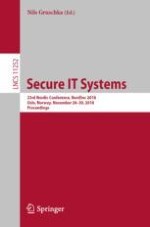2018 | OriginalPaper | Buchkapitel
What You Can Change and What You Can’t: Human Experience in Computer Network Defenses
verfasst von : Vivien M. Rooney, Simon N. Foley
Erschienen in: Secure IT Systems
Aktivieren Sie unsere intelligente Suche, um passende Fachinhalte oder Patente zu finden.
Wählen Sie Textabschnitte aus um mit Künstlicher Intelligenz passenden Patente zu finden. powered by
Markieren Sie Textabschnitte, um KI-gestützt weitere passende Inhalte zu finden. powered by
